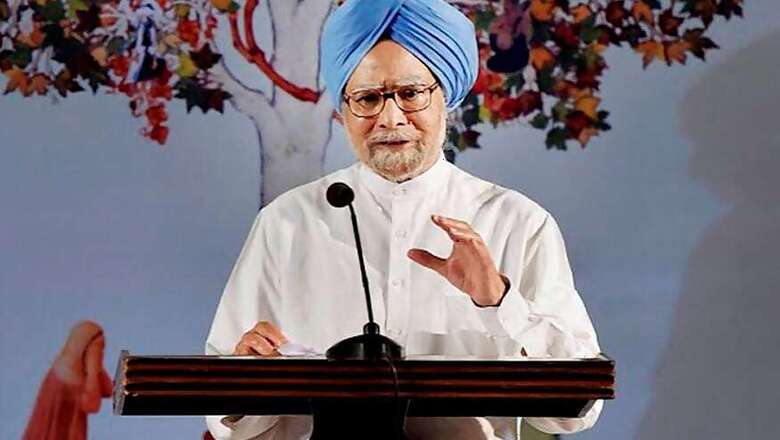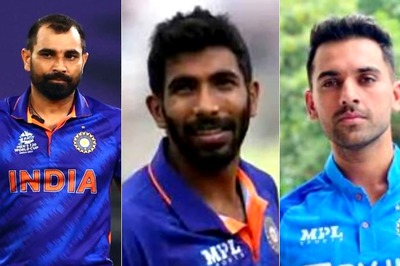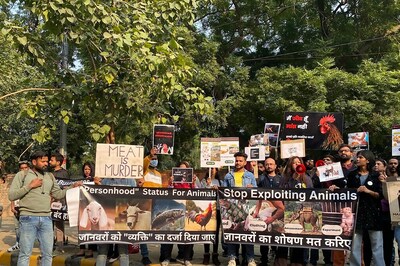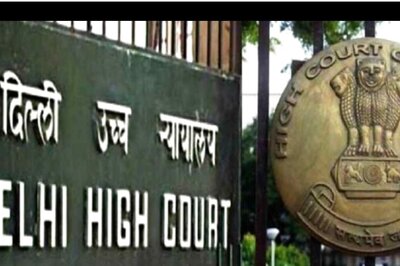
views
New Delhi Former prime minister Manmohan Singh on Saturday warned that use of religion and caste by political parties to capture power can create an atmosphere of hate and division and asserted that saner elements in the society need to unite to counter such evil designs.
He said that attempts at communal polarisation create an atmosphere of fear, anxiety and uncertainty and said secular character of all the institutions, Judiciary, Executive and Legislature, is a pre-requisite for peace and harmony.
Addressing a conference organised by the Pranab Mukherjee Foundation, Singh claimed that the integrity of major institutions is facing many challenges in the country, while noting that a nation without well functioning institutions is "bound to fail".
The deterioration adversely affects the functioning of state organs and erodes their credibility, he said.
"Such a situation, he said, can create chaos in society, economy and polity," he said at the conference -- 'Towards Peace, Harmony and Happiness: Transition to Transformation' .
The Congress leader said that institutions of governance are a necessary condition to maintain peace and harmony. Besides, they must be impartial, objective and should function for the benefit of all sections of society.
"Unfortunately, the use of religion, caste and other such factors by the political parties to advance their political interests and capture power can create an atmosphere of hate and division among religious and caste groups. Such an environment poses a serious challenge to the peaceful transition and transformation.
"It is in this context that the saner elements in the society need to unite and counter the evil designs of those forces that are bent upon to disrupt the peace, harmony and happiness" he said.
Quoting Rabindra Nath Tagore, Mahatma Gandhi, Gurunanak and Sir Muhammad Iqbal, widely known as Allama Iqbal, the former prime minister said that they all wanted a nation which was free of communal unrest and without any division among people based on their caste, creed, colour, religion or baseless superstitions.
"It should always be remembered that India is multi-cultural, multi-ethnic and multi-lingual country. However, there are certain forces which are taking advantage of such diversity and pose a threat to the unity of the country.
"In a multi-religious society, communal harmony is very important for citizens to lead a life free from fear, anxiety and uncertainty," he said.
Singh's remarks came on the eve of a 'dharam sansad' (religious conclave)called by Vishwa Hindu Parishad in Ayodhya on the sensitive Ram temple issue.
The former prime minister said that there were various types of economic and non-economic factors which give rise to fears, anxieties and uncertainties and that the underlying reasons behind them should be diagnosed to translate the conflict and anger into peace, harmony and happiness.
"That would require transparency, honesty, probity and truthfulness in public life," he said.
Maintaining secular character of all the institutions is a pre-requisite for peace and harmony, he said, adding that eventually it is the responsibility of the political and religious leadership, civil society, intelligentsia and the media to uphold the Constitution and the integrity of institutions.
"When the institutions start deviating from a just discharge of their constitutional responsibilities and knowingly or unknowingly fall prey to the extra-constitutional powers and non-state actors, then there is a danger of violence entering into the process of transition and transformation," he remarked.
He said that economic growth and development was a necessary condition but not a sufficient one for having peace, harmony and happiness in the society. Empowering the underprivileged and marginalized with education, skill and good health is an important means to make the people partners in growth and development, he said.
"The sustainable development goals(SDGs), set by the United Nations for 2015-2030, are aimed at achieving peace, harmony and happiness for all and have a smooth transition to transformation.
"Happiness is the ultimate goal of mankind and it goes beyond the economic growth and development.The physical quality of life and UNDP's human development index (HDI) is a reflection of this reality. It would be useful to prepare state wise indices of happiness in India," he said.

















Comments
0 comment